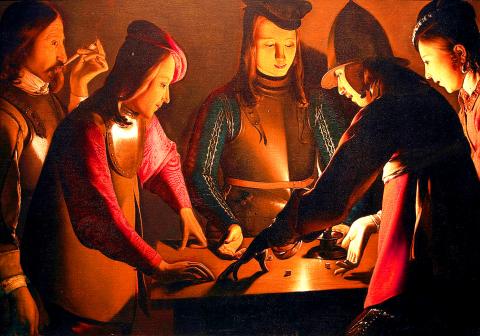Chinese practice
大局已定
a foregone conclusion

Photo: Wikimedia Commons
照片:維基共享資源
(da4 ju2 yi3 ding4)
英文片語「the die is cast」,意指某種決定或選擇已經做出,無法被撤銷或改變,意味這已成定局──現在的情況取決於命運的安排,決定權已不在我們手中。
有趣的是,除了文法用詞(「the」和「is」)以外,此語之名詞「die」和動詞「cast」各自的多重含意,可以為「the die is cast」這句話排列組合出兩種完全不同的意思,及其比喻方式。
第一種意思是根據「die」字其中一個意義──鑄造用模具──自古代便已使用模具來大量完整複製物品,例如硬幣。鑄模一旦做好,就決定了將複製出物品的形式,表示「已定案」的意思──這解釋是把「the die is cast」翻譯成「模具已經鑄造好了」。但這解釋有幾個問題。第一,許多製造硬幣的模具是雕刻出來的,並非鑄造而成的,因此多少削弱了這比喻的力量。
另一個問題,是因為有第二種解釋:若採「die」的另一義──「骰子」的英文單數形(複數為「dice」),便可把「the die is cast」翻譯成「骰子已經丟出去了」。這是援引一句拉丁文「iacta alea est」。古羅馬歷史學家蘇埃托尼烏斯(約六九~約一二二)認為,這句話是凱撒所說──西元前四十九年,凱撒率領大軍橫渡義大利北部的魯比肯河時說了這句話。那是一次決定性的軍事行動,導致了曠日持久的內戰。
拉丁文的「iacta」來自意為「丟」的動詞,而非「鑄造」;「alea」意為「骰子」,如「half of a pair of dice」(一對骰子中的一個);「est」來自意為「to be」的動詞。這句話現今較常見的詞序是「alea iacta est」,英譯後較符合英文「the die is cast」的詞序;正如上週「活用成語」單元中所介紹,拉丁文的詞序是可變動的。此外,這句拉丁文的意義肯定是指「拋出骰子」,而非鑄造出模具。更何況,凱撒這句話即便不是用拉丁文說的,而是希臘文,但鐵定不是用英文說的,所以不會有英文「the die is cast」的不同解釋。
壓垮第一種解釋(「鑄造」)的最後一根稻草是這句話:「Is the die cast, must at this one throw all thou hast gaind be lost?」(你這最後一擲,必會輸掉一切嗎?),初見於一六三四年出版的托馬斯‧赫伯特爵士的《A Relation of Some Yeares Travaile, Begunne Anno 1626》(自一六二六年起工作數年的故事)。此處赫伯特也用了動詞「throw」來描述「die 」一字,因此我們知道他指的是「骰子」,而非模具。
「the die is cast」的意義用中文來說,可用「大局已定」來表示,這比較算是一種說法,而非成語。「局」這個字有幾個含義,其一為「情境」,另一為「棋局」──無論是哪一種,「大局已定」都是指最終的情勢已經底定。
(台北時報林俐凱譯)
紅隊一路領先,以為大局已定,沒想到最後白隊一記三分球,扭轉了局勢,反敗為勝。
(The red team was ahead for the whole game, and thought it was all over. Then, the white team got three points and turned the game around, snatching victory from the jaws of defeat.)
雖然開票還沒結束,但是就目前的數字來看,大局已定,你就洗洗睡了吧。
(They haven’t finished counting all the votes yet, but from the numbers we’re seeing it looks like your candidate has lost, so you might as well go to bed.)
英文練習
the die is cast
The English expression “the die is cast” means that a decision or choice has been made that can no longer be revoked or changed. It implies a finality, that the situation is now up to the workings of fate, and the decision is now out of our hands.
Interestingly, the “grammar” words (“the” and “is”) aside, both the noun (“die”) and verb (“cast”) collocate in completely different ways, giving two possible interpretations of the phrase’s metaphorical meaning.
The first interpretation is that the die refers to the mold used in the ancient world to reproduce large numbers of perfect copies of things, such as coins. Once the die was made, it would dictate the form of the copy produced, giving us the concept of a decision that is set in stone. There are several problems with this interpretation. Firstly, many of the dies used for producing coins were carved or engraved. Even if some dies were also cast, the fact that many were not would weaken the metaphor.
The next problem involves the second interpretation. That is, “die” refers to the singular form of “dice.” The idea is that the phrase derives from a Latin quote — iacta alea est — attributed to Julius Caesar by the Roman historian Suetonius (c. 69 – c.122) as Caesar led his army across the Rubicon river in Northern Italy in 49 BC, in a decisive move that would lead to a drawn-out civil war.
In Latin, iacta comes from the verb “to throw,” not “to cast molten metal”; alea means “die” as in “half of a pair of dice,” and not “mold”; “est” comes from the verb “to be.” The more commonly used version of the quote that has come down to us is alea iacta est, more in keeping with the word order of the English translation “the die is cast.” As we saw in Using Idioms last week, word order in Latin is flexible. This aside, the quote here definitely refers to the throwing of a die, and not preparing molds for metal casting. And even though Caesar may well have originally said those words in Greek, not in Latin, he certainly did not say them in English.
The final nail in the coffin to the first interpretation is the first known printed appearance of the phrase in English, found in A Relation of Some Yeares Travaile, Begunne Anno 1626, by Sir Thomas Herbert, published in 1634: “Is the die cast, must at this one throw all thou hast gaind be lost?” (must you lose everything with this last throw?). Here, Herbert also uses the verb “throw,” so we know that he had dice in mind, not mold on the brain.
In Chinese we can say 大局已定, which is more of a saying than an idiom. The word ju 局 has several meanings, one of which is “situation,” another being “chess game.” Whichever it refers to here, it carries the meaning that the conclusion has already been decided.
(Paul Cooper, Taipei Times)
You can still change your mind. The die is not yet cast. If you walk out that door now, however, I’m not letting you back in.
(大局還未定,你還可以反悔。如果你走出這道門,我就不會讓你再踏進來。)
I’ve accepted the offer from the university in Singapore. That’s it: the die is cast. I can no longer change my mind.
(我收到新加坡大學的入學通知,已經決定要去唸了。大局已定,我不能再變卦了。)

A: Hey, the world’s major dictionaries just unveiled their words of the year for 2025. B: Yup, the Cambridge Dictionary chose the word “parasocial,” which refers to a connection that someone feels between themselves and a famous person they don’t really know. A: One-sided parasocial relationships with celebrities, influencers and even AI chatbots have clearly become more common. B: The Oxford Dictionary picked “rage bait” — online content designed to elicit anger by being frustrating, provocative or offensive in order to increase traffic to Web sites or social media accounts. A: The Collins Dictionary picked “vibe coding.” Let’s

A: Apart from the world’s major dictionaries, the online Dictionary.com actually picked “67” as its word of the year. B: What does “67” even mean? A: Even the dictionary wasn’t exactly sure about its meaning. The slang term’s origin might be traced to US rapper Skrilla’s song Doot Doot (67). Aren’t Taiwanese media outlets choosing the Mandarin word for 2025? B: Yeah and after hearing the song Good-for-Nothing, adapted from some catchphrases of Legislator Wang Shih-chien, I’m going to vote for the character “tsung” (hasty) from the lyrics. A: Hopefully, in the new year, we’ll be calm as the

Sea star wasting disease (SSWD) is a strange and serious illness affecting sea stars, or starfish. This disease causes sea stars to develop painful lesions, lose their arms, and eventually turn into a gooey, melted mess. Since it was first observed in 2013, millions of sea stars along the Pacific coast of North America have died from this __1__. Although viruses were once considered a possible cause, researchers now believe that environmental stressors and microorganisms are primarily __2__ for sea star wasting disease. One of the main environmental triggers appears to be warmer ocean water. When the water heats

For many people in Taiwan, childhood memories of rural life include pig pens standing beside family homes. Leftover rice, vegetable scraps and soup from daily meals were poured into buckets and fed to pigs. This practice of feeding pigs with household food waste was once a common way of life, both an economic choice and an expression of agricultural society’s deep respect for conserving resources. From a practical standpoint, pigs are omnivorous animals capable of efficiently digesting food scraps that humans can no longer eat. For rural households, food waste cost almost nothing, yet it could be converted into pork, a